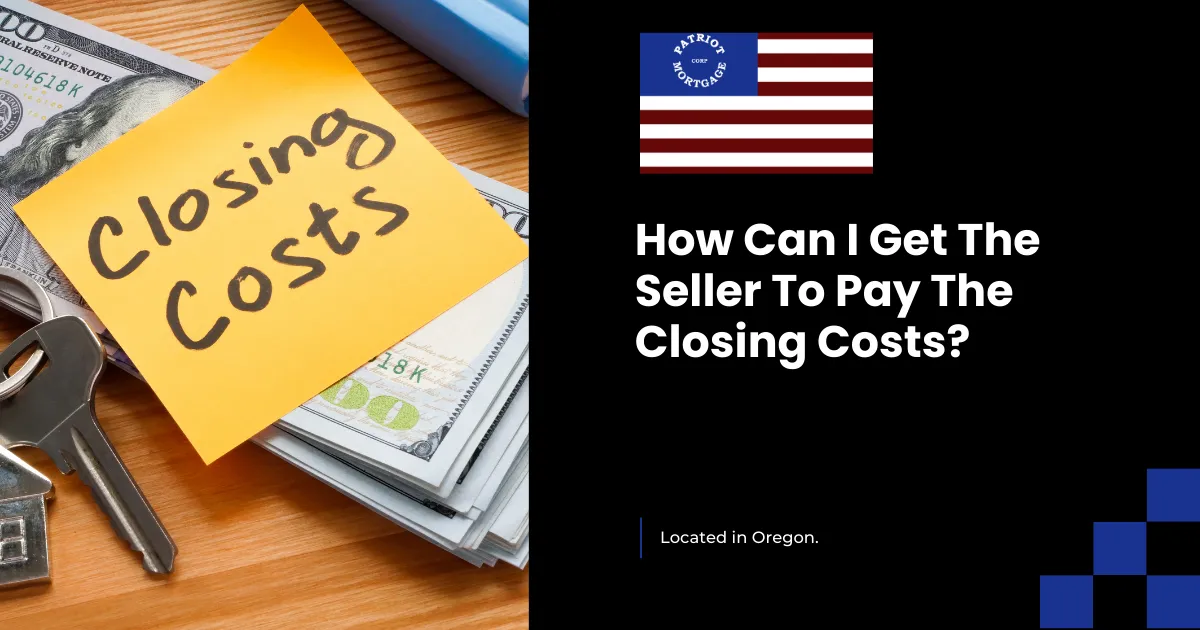
How Can I Get The Seller To Pay Closing Costs?
Introduction
Closing costs can add up quickly, and for many homebuyers, coming up with extra cash on top of the down payment can be a challenge. One way to alleviate this financial burden is by negotiating with the seller to pay for some or all of your closing costs. In this blog, we’ll explore strategies to get the seller to cover your closing costs and help make your home purchase more affordable.
Understanding Closing Costs
What Are Closing Costs?
Typical Fees: Closing costs include various fees such as loan origination fees, appraisal fees, title insurance, escrow fees, and more. These costs typically range from 2% to 5% of the home’s purchase price.
Buyer and Seller Responsibilities: Both buyers and sellers have closing costs, but it’s possible to negotiate for the seller to cover a portion of the buyer’s costs.
Strategies to Negotiate Seller-Paid Closing Costs
Include in the Offer
Write it Into the Contract: When making an offer on a home, you can include a request for the seller to pay for a specific amount or percentage of the closing costs. This request should be clearly stated in the purchase agreement.
Competitive Offers: In a competitive market, consider offering a higher purchase price in exchange for the seller covering closing costs. This can make your offer more attractive while still helping you manage upfront expenses.
Know the Market Conditions
Buyer’s Market: In a buyer’s market, where there are more homes for sale than buyers, sellers may be more willing to negotiate on closing costs to make the sale.
Seller’s Market: In a seller’s market, with more buyers than available homes, it might be harder to get sellers to agree to pay closing costs. However, it’s still worth asking, especially if the home has been on the market for a while.
Highlight Your Strengths as a Buyer
Pre-Approval: Showing the seller that you are pre-approved for a mortgage can strengthen your negotiation position. It demonstrates that you are a serious and qualified buyer.
Flexible Closing Date: Offering flexibility on the closing date can be a bargaining chip. If the seller needs more time to move out, being accommodating can make them more willing to cover your closing costs.
Use Seller Concessions
Repair Credits: If the home inspection reveals issues, you can negotiate for the seller to give you a credit towards closing costs instead of making repairs. This can be beneficial for both parties.
Personal Property: Sometimes, sellers are willing to leave behind appliances or other personal property in lieu of paying closing costs. This can reduce your need for additional purchases after moving in.
Loan Program Considerations
Loan Limits on Seller Contributions
FHA Loans: With an FHA loan, sellers can contribute up to 6% of the home’s purchase price towards closing costs.
Conventional Loans: For conventional loans, the seller’s contribution limit depends on the down payment amount. For example, if your down payment is less than 10%, the seller can typically contribute up to 3%.
VA Loans: For VA loans, sellers can pay all of the buyer’s closing costs and up to 4% of the purchase price in concessions, which can include things like paying off the buyer’s debt to help them qualify for the loan.
Tips for Successful Negotiations
Work with a Skilled Realtor
Experienced Negotiator: A knowledgeable real estate agent can provide valuable insights and help you navigate the negotiation process. They understand market conditions and can advise on the best strategies to get the seller to cover closing costs.
Market Analysis: Your agent can conduct a comparative market analysis (CMA) to determine the fair market value of the home and help you craft a competitive offer that includes closing cost assistance.
Be Prepared to Compromise
Flexible Negotiations: Be open to compromise. If the seller is unwilling to cover all your closing costs, try negotiating for them to cover a portion. Every bit helps in reducing your upfront expenses.
Other Concessions: If covering closing costs is not an option, explore other concessions that the seller might be willing to make, such as paying for a home warranty or including additional repairs.
Conclusion
Getting the seller to pay for your closing costs can make a significant difference in your home buying budget. By understanding market conditions, leveraging your strengths as a buyer, and working with an experienced realtor, you can negotiate effectively to have the seller cover some or all of your closing costs. Remember, every negotiation is unique, so be prepared to explore different strategies and compromises to achieve the best outcome for your financial situation.
For more resources, visit the following links:
Social Media Links
YouTube



